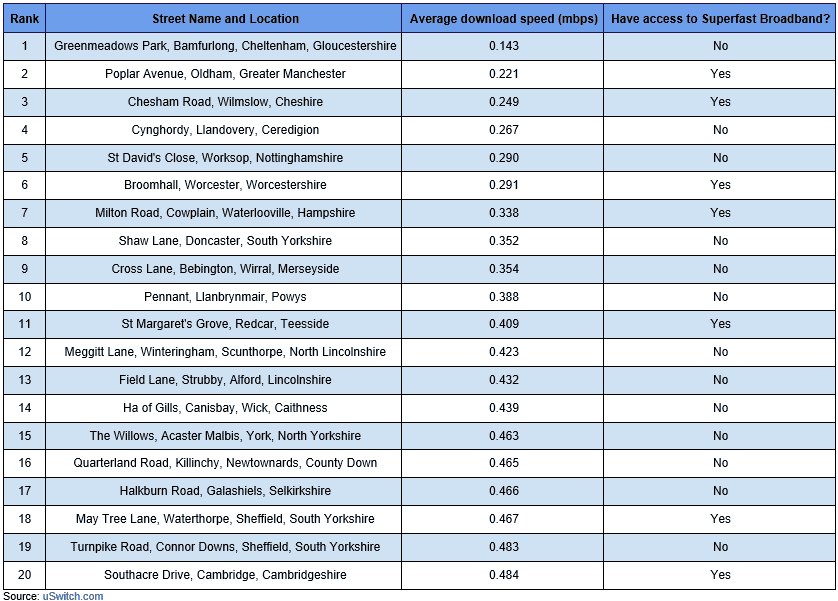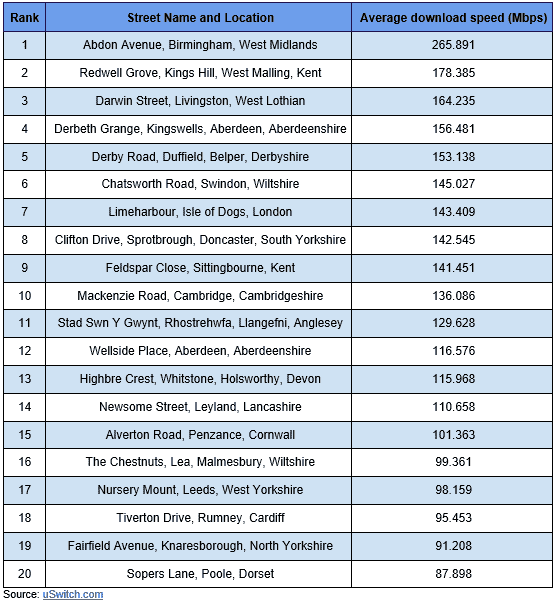UK’s worst street for broadband nearly 2,000 times slower than fastest
The slowest street for broadband is Greenmeadows Park in Bamfurlong, Gloucestershire – with average download speeds of 0.14Mbps
This is 1,899 times slower than Abdon Avenue in Birmingham, which boasts average speeds of 265.89Mbps****
The average speed in the UK is 46.2Mbps, yet a quarter (26.3%) of homes struggle with speeds of less than 10Mbps and one in eight (13.3%) crawl along below 5Mbps
The South West dominates the speed rankings – five of the UK’s fastest streets are in Devon, Dorset, Cornwall and Wiltshire
Meanwhile nine of the UK’s slowest streets can be found north of the Mersey – including South Yorkshire, Greater Manchester, North Yorkshire, Scotland and Merseyside
More than a third (35%) of the slowest streets have access to superfast or fibre broadband.
The slowest broadband in the UK, with an average download speed of 0.14Mbps, is found on Greenmeadows Park in Bamfurlong, Gloucestershire, according to the latest consumer speed tests collected by Uswitch.com, the price comparison and switching service.
Greenmeadows Park suffers average speeds that are a staggering 1,899 times slower than the UK’s fastest street, Abdon Avenue in Birmingham, where average speeds have reached 265.89Mbps over the past year.
In Greenmeadows Park it would take more than 102 hours to download a two-hour HD film on Netflix and at least 38 hours to download a 45-minute HD TV show. By contrast, on Abdon Avenue it would take less than four minutes to download the same film and just 72 seconds to download the same TV show.
According to the research, which is based on more than 279,186 ‘real world’ speed tests run by broadband users over the last year, a quarter (26.3%) struggle with speeds of less than 10Mbps, while one in eight (13.3%) crawl along at less than 5Mbps.
However, the number of broadband users enjoying faster speeds is growing. Nearly a third of users (31%) now get speeds of 30+ Mbps, up from less than a quarter (22%) three years ago. But despite the fact that the availability of superfast broadband services has increased to 95% as of May 2018, a recent Uswitch survey found that only just over half (56%) of Brits believe they can access it in their local area.
Broadband users living in the South West are the most likely to find themselves with superfast speeds. Five of the UK’s fastest broadband streets can be found across Devon, Dorset, Cornwall and Wiltshire. By contrast, if you head north of the Mersey you are more likely to encounter streets that struggle with molasses-like internet; nine of the slowest streets for broadband can be found in the likes of North and South Yorkshire, Teeside, Manchester and across Scotland.
When it comes to broadband speeds, it’s still very much a postcode lottery. Areas such as South Yorkshire and Cambridge experience some of the fastest – and some of the slowest – broadband, with it being a happy coincidence if you are on one of the streets with a quick service.
In fact, superfast broadband is available on more than a third (35%) of the UK’s slowest streets, but a lack of awareness that a better service is accessible results in many being resigned to poor download speeds.
Slowest streets for broadband in the UK

Fastest streets for broadband in the UK

Dani Warner, broadband expert at Uswitch.com, says: “This research lays bare the extent of the UK’s digital divide. Streets that are relatively close geographically can be light years apart when it comes to the download speeds they are getting. It’s almost comical that it would take someone in Bamfurlong more than 100 hours to download a two-hour HD film, such as Mamma Mia! Here We Go Again, yet someone living just an hour’s drive away on Abdon Avenue in Birmingham can download the same film in just over four minutes.
“Awareness of fibre broadband availability continues to be the biggest hurdle to people getting faster download speeds. Over a third of the slowest streets have access to superfast speeds, so people living there have no need to be crawling along on completely unusable internet services. The industry should be doing more to help consumers understand what sort of broadband they can get at home. And for those who can’t yet obtain faster speeds – which the industry is directly aiming to address with the rollout of full-fibre – improvements really can’t come soon enough.
“For households struggling on sluggish internet connections, it’s worth having a look at a coverage map to give you, at a glance, an overview of the sort of services that are available at your address. If your current broadband doesn’t stack up to what other providers can give you, it might be worth thinking about switching. Just make sure you are outside your initial contract period as you may be stung with a hefty termination fee if not. However, if your speeds are significantly slower than what you were promised when you signed up, you could even be eligible to leave for free.”
Anyone frustrated with their broadband service can test speeds and compare results to other local users with different providers here: www.uswitch.com/broadband/speedtest
Find out how you could save over £1,000 a year with Uswitch here.
FOR MORE INFORMATION
Rory Stoves
Phone: 020 3872 5613
Email: rory.stoves@uswitch.com
Twitter: @UswitchPR
Notes to editors
For the top 20 streets We took the slowest and fastest postcodes from the 279,186 speeds tests, across 148,013 unique IP addresses within 29,816 postcodes. These were taken over a twelve month period – 1st October 2017 to 30th September 2018. In order for a street to qualify for inclusion in the top or bottom 30, tests from at least three unique IP addresses and at least 10 residential properties were required at a postcode.
See tables of UK’s 20 slowest and 20 fastest streets for broadband above
Fast street in the UK is Abdon Avenue (265.89Mbps) and the slowest street is Greenmeadows Park (0.14Mbps). Average download speeds is now 46.2Mbps according to the latest Ofcom research. Calculations: 265.89/0.14 = 1,889 and 46.2/0.14 = 330
Calculated using this online tool: https://www.download-time.com File sizes: average 2-hour HD film on Netflix is 6GB, average HD 45-minute TV show on Netflix is 2.25GB
Figures take all 279,186 speed tests into consideration
Based on 1,030,865 consumer test during the six-month period Aug 2014-Feb 2015. More details can be found here.
Broadband Delivery UK intends to provide superfast broadband coverage to 95% of UK premises
Uswitch.com surveyed a sample of 3,006 UK adults (aged 18+) from the 9th to the 15th May. Results have been weighted to nationally representative criteria. Respondents were asked: ‘Superfast broadband is a term used by internet providers that usually refers to fibre or cable broadband. The Government defines superfast as speeds greater than 24Mbps. Is it possible to get superfast broadband in your area?’ The net response for ‘yes’ was 56%
Mamma Mia! Here We Go Again is 114 minutes. On the slowest street it takes 102 hours to download a 6GB film. 102 hours is equivalent to 6120 minutes. On the fastest street it takes 3.13 minutes to download a 6GB film. 6120/3 = 2,040 minutes.
About us
It’s all about “U”!
Thank you for indulging us over the last 20 years by using a small ‘u’ and a big ‘S’ when writing about our brand in your articles.
We are delighted to let you know that you are now off the hook - it’s big U’s all the way (and small s’s) as we undertake our biggest ever rebrand - so let your autocorrect go wild!
About Uswitch
Uswitch is the UK’s top comparison website for home services switching. Launched in September 2000, we help consumers save money on their gas, electricity, broadband, mobile, TV, and financial services products and get more of what matters to them. Last year we saved consumers over £373 million on their energy bills alone.
Uswitch is part of RVU, a new business that also owns Money.co.uk and Bankrate.
If you would no longer like to receive our press releases please email prteam@uswitch.com with 'unsubscribe'.
